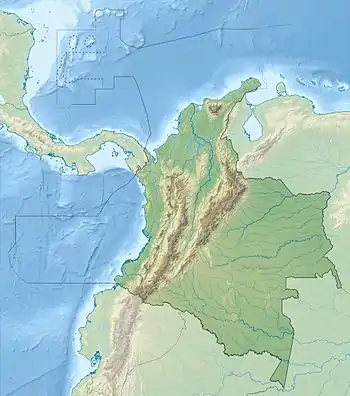| Yaguarasaurus Temporal range: Turonian, | |
|---|---|
 | |
| Skull and first cervical vertebrae of Yaguarasaurus. Geological Museum José Royo y Gómez, Bogotá | |
| Scientific classification | |
| Domain: | Eukaryota |
| Kingdom: | Animalia |
| Phylum: | Chordata |
| Class: | Reptilia |
| Order: | Squamata |
| Superfamily: | †Mosasauroidea |
| Family: | †Mosasauridae |
| Clade: | †Russellosaurina |
| Subfamily: | †Yaguarasaurinae |
| Genus: | †Yaguarasaurus Páramo 1994 |
| Type species | |
| †Yaguarasaurus columbianus Páramo 1994 | |
| Other species[1] | |
| |
Yaguarasaurus is an extinct genus of mosasauroid from the Late Cretaceous (Turonian) period of Colombia, South America. The remains discovered (an articulated skull, some vertebrae and ribs) were defined as a new genus and species of mosasaurid, Yaguarasaurus columbianus, by the Colombian paleontologist María Páramo, former director of the Museo de Geología José Royo y Gómez of INGEOMINAS in Bogotá. The first fossils remains of this animal suggested a cranial length of 47 centimetres (19 in) and a total length of 5 metres (16 ft); an additional skull that measures 87 centimetres (34 in) long implies a larger size.[2]
This reptile is a member of the family of marine lizards Mosasauridae characteristic of Middle and Upper Cretaceous, with global distribution, but in South America known only through isolated remains (Price, 1957, Pierce and Welles, 1959 ; Bonaparte, 1978;[3] Ameghino, 1918). This mosasaur discovered in Yaguará, was at the moment of discovery the most complete material known in South America.[4]

Etymology
The remains were found in a limestone bed (Upper Turonian) of the La Frontera Formation, member of the Villeta Group, near Yaguará, Huila, in a site called Cueva Rica.[5] Its name means "Yaguará lizard of Colombia".
Phylogeny

by Ron Blakey
The following cladograms illustrate the phylogenetic analyses of two competing hypotheses on the classification of Yaguarasaurus. Topology A represents the traditional view of the genus belonging to the subfamily Yaguarasaurinae following Palci et al. (2013).[6] Topology B follows Rivera-Sylva et al. (2023) and depicts a new hypothesis holding Yaguarasaurus as a basal member of the Plioplatecarpinae,[1] which was first proposed by Polcyn et al. (2023) based on the discovery of symapomorphies in the braincase.[7]
In the second scenario, the two species of Yaguarasaurus are paraphyletic with respect to more derived plioplatecarpines, with Y. regiomontanus lying further up the tree.
Yaguarasaurine per Palci et al. (2013)  | |||||||||||||||||||||||||||||||||||||||||||||||||||||||||||||||||||||||||||
|---|---|---|---|---|---|---|---|---|---|---|---|---|---|---|---|---|---|---|---|---|---|---|---|---|---|---|---|---|---|---|---|---|---|---|---|---|---|---|---|---|---|---|---|---|---|---|---|---|---|---|---|---|---|---|---|---|---|---|---|---|---|---|---|---|---|---|---|---|---|---|---|---|---|---|---|
|
Basal plioplatecarpine per Rivera-Sylva et al. (2023)  | |||||||||||||||||||||||||||||||||||||||||||||||||||||||||||||||||||||||||||||||||||||||||||||||||||||||||||||||||||||||||||
|---|---|---|---|---|---|---|---|---|---|---|---|---|---|---|---|---|---|---|---|---|---|---|---|---|---|---|---|---|---|---|---|---|---|---|---|---|---|---|---|---|---|---|---|---|---|---|---|---|---|---|---|---|---|---|---|---|---|---|---|---|---|---|---|---|---|---|---|---|---|---|---|---|---|---|---|---|---|---|---|---|---|---|---|---|---|---|---|---|---|---|---|---|---|---|---|---|---|---|---|---|---|---|---|---|---|---|---|---|---|---|---|---|---|---|---|---|---|---|---|---|---|---|---|
|
See also
References
- 1 2 Rivera-Sylva, H.E.; Longrich, N.R.; Padilla-Gutierrez, J.M.; Guzmán-Gutiérrez, J.R.; Escalante-Hernández, V.M.; González-Ávila, J.G. (2023). "A new species of Yaguarasaurus (Mosasauridae: Plioplatecarpinae) from the Agua Nueva formation (upper Turonian – ?Lower Coniacian) of Nuevo Leon, Mexico". Journal of South American Earth Sciences. doi:10.1016/j.jsames.2023.104694.
- ↑ Páramo, M.E. (2000). "Yaguarasaurus columbianus (Reptilia, Mosasauridae), a primitive mosasaur from the Turonian (Upper Cretaceous) of Colombia". Historical Biology. 14 (1–2): 121–131. doi:10.1080/10292380009380560. S2CID 129466921. Retrieved 2017-03-30.
- ↑ Bonaparte, J. F. (1978). El Mesozoico de América del Sur y sus Tetrápodos. Vol. 26. Ministerio de Cultura y Educación Fundación Miguel Lillo, San Miguel de Tucumán, Opera Lilloana. pp. 1–596.
- ↑ Páramo, M.E. (1994). "Posición sistemática de un reptil marino con base en los restos fósiles encontrados en capas del Cretácico Superior en Yaguará (Huila)". Revista de la Academia Colombiana de Ciencias Exactas, Físicas y Naturales. 19 (72): 63–80.
- ↑ Yaguarasaurus columbianus at Fossilworks.org
- ↑ Palci, A.; Caldwell, M. W.; Papazzoni, C. A. (2013). "A new genus and subfamily of mosasaurs from the Upper Cretaceous of northern Italy". Journal of Vertebrate Paleontology. 33 (3): 599. doi:10.1080/02724634.2013.731024. S2CID 86646993.
- ↑ Polcyn, Michael J.; Bardet, Nathalie; Albright III, L. Barry; Titus, Alan (2023). "A new lower Turonian mosasaurid from the Western Interior Seaway and the antiquity of the unique basicranial circulation pattern in Plioplatecarpinae". Cretaceous Research. doi:10.1016/j.cretres.2023.105621 – via Elsevier Science Direct.
External links
- (in Spanish) Yaguarasaurus columbianus - Paleontología en Colombia



